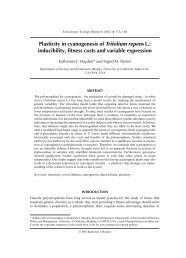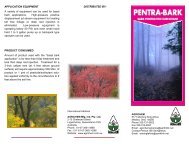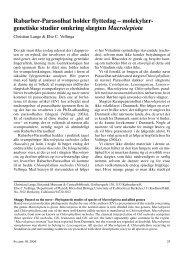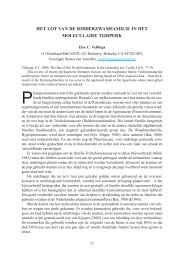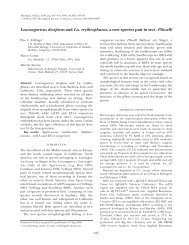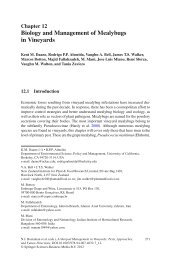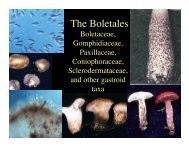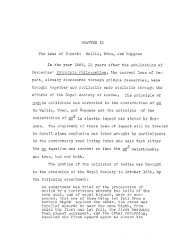2013-14 Undergraduate Student Handbook - College of Natural ...
2013-14 Undergraduate Student Handbook - College of Natural ...
2013-14 Undergraduate Student Handbook - College of Natural ...
Create successful ePaper yourself
Turn your PDF publications into a flip-book with our unique Google optimized e-Paper software.
Minoring in the <strong>College</strong> <strong>of</strong> <strong>Natural</strong> Resources<br />
CNR <strong>of</strong>fers seven undergraduate minor programs. <strong>Student</strong>s in any major with the<br />
appropriate prerequisites may pursue a minor in CNR.<br />
Conservation and Resource Studies (CRS) is an interdisciplinary program<br />
designed for students who are interested in environmental issues both from<br />
the social science and natural science perspective. <strong>Student</strong>s may study areas <strong>of</strong><br />
interaction among natural resources, population, energy, technology, societal<br />
institutions, and cultural values. <strong>Student</strong>s may elect to complete this minor through<br />
a list <strong>of</strong> pre-approved courses or develop their own interdisciplinary group <strong>of</strong><br />
courses similar to the structure <strong>of</strong> the CRS major.<br />
Energy and Resources Group (ERG) <strong>of</strong>fers undergraduates the opportunity<br />
to develop basic knowledge and skills to help them address the complex and<br />
interdependent issues associated with the interaction <strong>of</strong> social, economic,<br />
political, technical, and environmental factors. Though it is designed primarily<br />
to complement majors in the natural sciences and engineering, students in any<br />
major with the appropriate prerequisites may pursue the ERG Minor.<br />
Environmental Economics and Policy (EEP) <strong>of</strong>fers interested students<br />
an opportunity to explore aspects <strong>of</strong> economic and political institutions that affect<br />
the development and management <strong>of</strong> natural resources and the environment.<br />
Forestry and <strong>Natural</strong> Resources (FNR) is for students who are interested<br />
in learning about these subjects as an adjunct to their chosen fields. <strong>Student</strong>s from<br />
many different majors such as integrative biology, business administration, and<br />
civil engineering find this minor complementary to their pr<strong>of</strong>essional career goals.<br />
Geographic Information Systems (GIS) <strong>of</strong>fers undergraduates the<br />
opportunity to develop basic knowledge and technical skills in geographic<br />
information systems to help them address the ways in which spatial data and<br />
analysis can support and define environmental, urban, and natural resource<br />
sciences. The minor is designed to complement majors in the natural sciences,<br />
social sciences, and engineering.<br />
Nutritional Science (NS) or Molecular Toxicology (MT) minors are<br />
available to students who have pursued basic coursework in the biological sciences<br />
under other majors. The research and curriculum span a breadth <strong>of</strong> topics from<br />
the delivery <strong>of</strong> nutrients to mammalian cells and their molecular functions, to the<br />
influence <strong>of</strong> genetics on diet-associated human disease.<br />
“ Since CNR<br />
is one <strong>of</strong> the<br />
smaller colleges<br />
on campus it<br />
really provides<br />
an intimate<br />
atmosphere for<br />
all our students.<br />
You get to know<br />
each other on a<br />
first name basis.<br />
You get to know<br />
your advisors<br />
on a first name<br />
basis. They’re<br />
very welcoming,<br />
always<br />
accessible,<br />
and more than<br />
willing to help<br />
you out.”<br />
--Amelia Appell ‘13<br />
Society &<br />
Environment<br />
23




